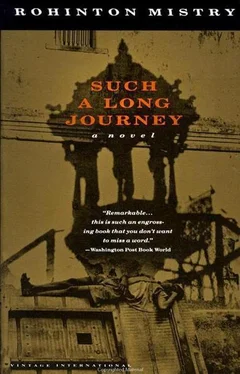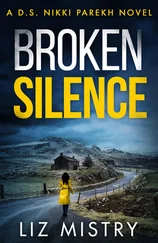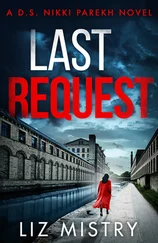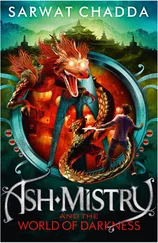The holy countenances on the wall — some grim and vengeful, some jovial, some compassionate, others frightful and awe-inspiring, yet others kind and avuncular — watched over the road, the traffic, the passers-by, day and night. Nataraja did his cosmic dance, Abraham lifted his ax high above Isaac, Mary cradled the Infant Jesus, Laxmi dispensed wealth, Saraswati spread wisdom and learning.
But the artist began to have misgivings as the wall underwent its transformation. Bigger than any pavement project he had ever undertaken, it made him restless. Over the years, a precise cycle had entered the rhythm of his life, the cycle of arrival, creation and obliteration. Like sleeping, waking and stretching, or eating, digesting and excreting, the cycle sang in harmony with the blood in his veins and the breath in his lungs. He learned to disdain the overlong sojourn and the procrastinated departure, for they were the progenitors of complacent routine, to be shunned at all costs. The journey — chanced, unplanned, solitary — was the thing to relish.
Now, however, his old way of life was being threatened. The agreeable neighbourhood and the solidity of the long, black wall were reawakening in him the usual sources of human sorrow: a yearning for permanence, for roots, for something he could call his own, something immutable. Torn between staying and leaving, he worked on, ill at ease, confused and discontented. Swami Dayananda, Swami Vivekananda, Our Lady of Fatima, Zarathustra, and numerous others assumed their places on the wall, places preordained by the pavement artist; together, they awaited the uncertain future.
The air-raid siren poured its howls into the bank through the open window. To Gustad’s ears, the rising and falling wail heralded better days, dismissing the chilling ululation of impending disaster it had been so far. At dawn, he had offered up special thanks. The halfway mark was crossed, today the fifty-first bundle would be deposited. Dada Ormuzd, my gratitude. For keeping trouble away. And for Roshan, so much better, some colour back in her cheeks at last.
The morning flew by. He met Dinshawji, passed him the bundle. ‘What’s the news, Dinshu? What about the Pakistanis?’
Dinshawji turned both hands palms up. ‘Who knows? I have not yet seen the paper.’ He stood, and Gustad glanced at his stomach. There it was, what he had been noticing for the past few days: a swelling, as though something was growing in there. He turned away before he was caught looking.
Dinshawji dragged himself painfully to the bathroom. Though he had renounced his clowning, people continued to expect one of his innumerable jokes when they exchanged morning greetings with him or asked how he was. They held themselves in readiness for laughter, but now there was one stock answer for everyone: ‘Thussook-thussook, my cart rumbles along.’ The first few times, people assumed that since it came from Dinshawji, it must be funny, perhaps some kind of subtle deadpan humour. Stubborn perceptions of the jovial man and his quick tongue persisted in their minds. So they chuckled or smiled broadly and slapped his shoulder.
But when he repeated the response morning after morning: ‘Thussook-thussook, my cart is rumbling along,’ they had to give in to the reality demanding acknowledgement. Now they wanted to hold his hand and comfort him, but all they said, morning after morning, was: ‘How are you, Dinshawji?’ and he answered with the words which let them share his pain.
Gustad had suspected the truth about Dinshawji’s illness ever since Roshan’s birthday. But when it became known to everyone in the bank, the truth seemed to multiply in intensity, following some perverse undiscovered law of physics, whereby the burden grew directly in proportion to the number of people carrying it. He prayed for Dinshawji every morning. That he was responsible for forcing him to abandon his comic ways gnawed at his conscience. After all, if Roshan could feel better because of her doll, perhaps Dinshawji got worse because he had to give up his games. But besides guilt, there was also shame — his prayers had a selfish motive: should Dinshawji stop coming to work, it would interrupt the deposits, delay the riddance of the package in the choolavati.
In the evening the pavement artist, his unease and restlessness having disappeared, was happily whistling ‘You Are My Sunshine’. He greeted Gustad and said that today, a small bunch of flowers had been left before the drawing of Saraswati. ‘Must be someone sitting for an exam.’
‘That means respect for the wall is increasing, thanks to your beautiful pictures,’ said Gustad. The artist smiled modestly, bowing his head, and said that in the last few days, passers-by had left enough money to pay for a new set of clothes and a pair of shoes. He planned to go shopping soon. Gustad inspected the latest deities and entered the gate, whistling the tune that had been on the artist’s lips. He saw Dilnavaz on the steps outside, hushing and scolding the children, urging them to go to the far end of the compound and play without making any noise. The whistle ceased, his mouth went dry. He walked faster.
‘It’s started again,’ she said. ‘Very loose motions, seems worse than before.’
He dropped his briefcase on the desk. The fledgling bits of hope he had been nurturing all day took wing. Like the sparrows that chirped in the compound’s solitary tree, but flew away if the Landmaster backfired, Gustad’s hope circled once over his head and departed. If it were possible to, he would have leaped up to hold on to it. ‘Is she asleep?’
‘No. Stupid children outside, making so much noise.’
He went to Roshan’s bedside and leaned over the slatted door to kiss her forehead. The doll lay beside her, arrayed in the bridal finery that seemed so funereal now. It sent a shiver down his spine. He raised its head to make the eyes open, and left it leaning against the headboard. ‘There,’ he said. ‘Now the doll can look after you when you sleep. If she sleeps all day, she’ll become lazy and fat, like the dogwalla idiot’s daughter.’
He squeezed her hand and returned to the dining-room. ‘I’m going to the doctor, Roshan doesn’t need to come. And he better refer us to a specialist.’ Dilnavaz suggested a cup of tea before leaving. He untied his shoelaces and rested his feet on the teapoy. ‘At least this proves it could not have been bad water,’ he said. ‘You have boiled it every day.’
‘Who knows? Once an infection, virus, gets in the body—’
‘You still want to blame me? Fine!’ He retied his laces and dramatically poured the tea down the drain.
She regretted her words. For him to leave now, without anything having passed his lips after mention of tea, was extremely unpropitious. ‘OK,’ she said, ‘you hate me and you hate my tea. But at least drink a little water before going.’
‘Drink it yourself.’ He knew of her superstition, and was determined to make her suffer.
Dilnavaz debated whether to consult Miss Kutpitia while he was gone. The partial recovery, followed by this worsening, was most mystifying.
But then the doorbell rang. It took her a moment to recognize Dinshawji. She was surprised how much he had changed since Roshan’s birthday. All the same, she was not prepared to tolerate any of his silly jokes or rubbish, and made her greeting as stiff as possible: ‘Sahibji’. But there was nothing to fear. The man who had laughed and sung that night, drunk beer and recited rhymes, and done numerous small things to annoy her, was not the man who stood before her with a newspaper under his arm and a bulky envelope in his hand.
Читать дальше












